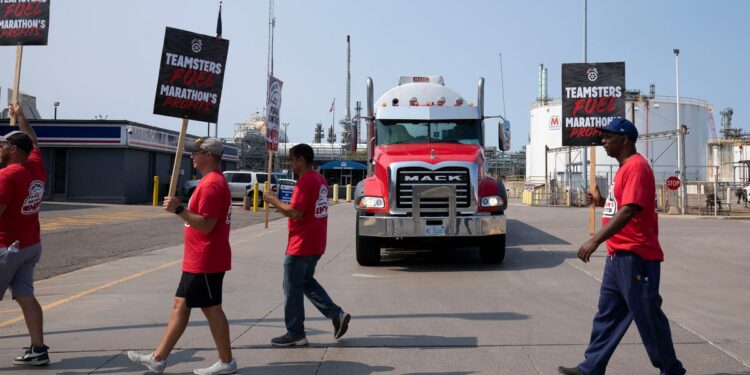The second largest union in the United States, the International Brotherhood of Teamsters, which has some 1.3 million members in various industries, has chosen not to endorse any candidate for the White House, saying they have not made satisfactory commitments.
• Also read: Truckers union drops support for Trump or Harris, setback for Democrat
Could this decision influence the November 5 vote? And could the fact that several local branches immediately gave their support to Democrat Kamala Harris change the situation?
AFP Photos
Who are the Teamsters?
The union was born in 1903 from the merger of two powerful truck drivers’ organisations in a country experiencing strong economic growth.
It has since expanded to include sectors (legal professions, agricultural workers, sanitation workers, zoo workers, construction workers, bakers, health professionals, police, commercial airline pilots, etc.) and has been exported to Canada. It claims 10% of American union members.
Like other American union organizations, it negotiates collective agreements by site or sector on behalf of its members. And it organizes strikes, if necessary.
According to its website, a unionized private sector employee earns on average 38% more than a non-unionized employee, and receives 54% more benefits.
What is your opinion on the candidates?
The Teamsters leadership announced Wednesday that it had decided not to endorse a candidate, saying that consultations with its members in recent months had not produced a majority for the Democratic Harris-Waltz ticket or the Republican Trump-Vance ticket.
And none have made “serious commitments” to the union leadership to show their intention to support workers against the companies, justified Sean O’Brien, president of the organization, in a press release.
But in the process, many local branches rallied behind Kamala Harris.
This is particularly the case on the West Coast with a group of affiliates with a total of 300,000 members (California, Nevada, Hawaii, Guam), as well as another with more than 85,000 members (Minnesota, Iowa, North Dakota and South Dakota, Wisconsin) and in Michigan (245,000 members). A branch in Wisconsin (15,000 members) and the largest in the country with 25,000 members, located in New York, have also given it their support.
According to American media, the Teamsters Black Caucus – which brings together African-American members – and the Western Pennsylvania branch (35,000 members in Pennsylvania and West Virginia) also support the Democrat.
Michigan, Wisconsin and Pennsylvania are among a handful of swing states that are crucial to the presidential election.Swing States). They voted for Donald Trump in 2016 and for Joe Biden in 2020.
What about previous presidential elections?
The organization had supported every Democratic candidate for the White House since Al Gore in 2000: John Kerry, Barack Obama, Hillary Clinton and Joe Biden.
She supported Republicans Ronald Reagan in 1984 and George HW Bush in 1988, before supporting Democrat Bill Clinton in 1992.
In 1996, she abstained from choosing in the Bill Clinton-Bob Dole duel.
What are the consequences for candidates?
“Without a doubt, this is a setback” for Kamala Harris “because it allows Trump to claim the support of the working class, if not the union,” said Nelson Lichtenstein, a specialist in the history of industrial relations at the University of California.
For Paul Clark, a professor at Pennsylvania State University who specializes in corporate labor relations, it must have been “a disappointment” for the Democratic camp, but “it’s not that important.”
Because Kamala Harris is supported by the other major unions and by many local branches of the Teamsters – representing around 500,000 union members at this point.
“National support is valuable to candidates because it activates the base,” which will mobilize people on the ground, making phone calls, going door to door, driving voters to the polls, etc., Clark said.
Since members don’t necessarily follow recommendations, “at the end of the day, local support is even more valuable,” he argues. “That’s what can impact the outcome of the election.”
Especially since the Democratic ticket has the support of the Teamsters in contested states. “That could allow Harris to cross the finish line in first place,” Mr. Clark notes.
According to him, in 2012, 58% of union households voted for Obama, then 51% for Hillary Clinton in 2016 and 57% for Biden in 2020.



